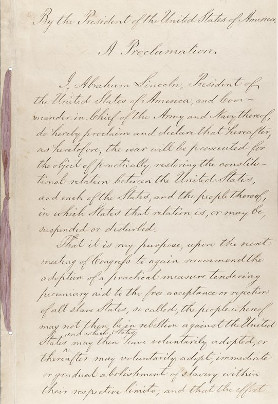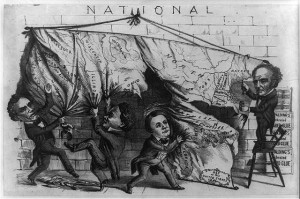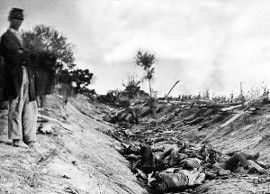Should we celebrate the Emancipation Proclamation’s 150th anniversary?
Posted September 22nd, 2012 by James DeWolf PerryCategory: Public History Tags: Abraham Lincoln, Battle of Antietam, Battle of Sharpsburg, Emancipation Proclamation
 Exactly 150 years ago today, on September 22, 1862, Abraham Lincoln issued his first Emancipation Proclamation, declaring that as of January 1, 1863:
Exactly 150 years ago today, on September 22, 1862, Abraham Lincoln issued his first Emancipation Proclamation, declaring that as of January 1, 1863:
… all persons held as slaves within any State, or designated part of a State, the people whereof shall then be in rebellion against the United States shall be then, thenceforward, and forever free.
Should we celebrate this declaration without reservation? Or should we, instead, see this as the anniversary of a tentative, morally ambiguous step, one which historian Richard Hofstadter declared to have “all the moral grandeur of a bill of lading“? ((Richard Hofstadter, The American Political Tradition and the Men Who Made It (1948).))




 A week ago I was still pronouncing “Antietam” as if it rhymed with “Vietnam.” Now I know it’s pronounced “Anteetum” … and so much more. My husband John and I had heard about the 150th anniversary commemorations of the Battle of Antietam/Battle of Sharpsburg, and since we’d been meaning to have a camping get-away, we decided that this was a great excuse to get outdoors and pursue my work goal of seeing how the 150th of the Civil War, and the role of slavery in the war’s causes and consequences, is being acknowledged at battlefields.
A week ago I was still pronouncing “Antietam” as if it rhymed with “Vietnam.” Now I know it’s pronounced “Anteetum” … and so much more. My husband John and I had heard about the 150th anniversary commemorations of the Battle of Antietam/Battle of Sharpsburg, and since we’d been meaning to have a camping get-away, we decided that this was a great excuse to get outdoors and pursue my work goal of seeing how the 150th of the Civil War, and the role of slavery in the war’s causes and consequences, is being acknowledged at battlefields.
 The origin of the word “cracker” was never important to me. ((The title of this blog post comes from www.vendio.com.)) Growing up in Vermont, my only relationship to the word was something we put in soup or ate with cheese. I was vaguely aware that it was a pejorative term of southerners, but I never gave it much thought.
The origin of the word “cracker” was never important to me. ((The title of this blog post comes from www.vendio.com.)) Growing up in Vermont, my only relationship to the word was something we put in soup or ate with cheese. I was vaguely aware that it was a pejorative term of southerners, but I never gave it much thought.